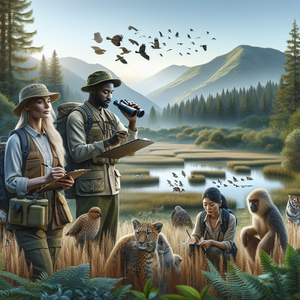
Your Journey into Wildlife Conservation: Exploring Career Opportunities and Making the Shift
Wildlife conservation stands as a vibrant and rewarding realm, attracting individuals from various walks of life, all bound by a deep-rooted passion for protecting our planet’s diverse ecosystems. If you’re considering a career transition into this vital sector, this guide will illuminate diverse career paths, share inspiring success stories, and provide practical strategies to help you navigate this shift, regardless of your background or if you have gaps in your resume.
Job Summaries:
Wildlife Biologist:
- Wildlife biologists play a pivotal role in understanding animal behaviors and populations.
- Vital for developing effective conservation strategies.
- Engage in field research.
- Collect and analyze data.
- Contribute to policy-making.
- Typically, a bachelor's degree in wildlife biology or zoology is required.
- Strong analytical skills are necessary.
Conservation Officer:
- These officers are guardians of wildlife laws.
- Ensuring compliance and educating the public on conservation practices.
- A degree in environmental science or a related field is usually necessary.
- Coupled with law enforcement training.
Wildlife Technician:
- Supporting biologists in research and monitoring wildlife populations is the core of a wildlife technician’s role.
- This often involves collecting data and managing habitats.
- A degree in wildlife management or a related field is helpful, along with technical abilities.
Environmental Educator:
- Environmental educators are vital in raising awareness about conservation.
- They create engaging programs targeted at schools and community groups.
- A background in education or environmental science is advantageous.
- Strong communication skills are beneficial for environmental educators.
Park Ranger:
- As stewards of national parks, park rangers ensure visitor safety while protecting natural resources.
- A background in environmental science or forestry enhances their effectiveness.
Wildlife Conservation Advocate:
- Advocates work tirelessly to promote policies that safeguard endangered species and habitats.
- A degree in environmental policy, law, or communications is often necessary.
Research Assistant:
- These individuals support scientists in wildlife studies by collecting data and ensuring research integrity.
- Typically in lab or field settings.
- A bachelor's degree in biology or ecology is usually required.
Habitat Restoration Specialist:
- These specialists rehabilitate damaged ecosystems to restore biodiversity.
- A background in environmental science or ecology, along with project management skills, is often needed.
Wildlife Photographer:
- Capturing stunning images of wildlife
- Photographers play a unique role in raising awareness about conservation issues
- Strong photography skills are essential
- An understanding of animal behavior is essential
Conservation Program Manager:
- These managers oversee conservation projects, coordinating teams and funding sources to ensure success.
- A degree in environmental science or project management, along with leadership skills, is crucial.
Marine Biologist:
- Studying ocean ecosystems
- Marine biologists conduct research to understand species and human impacts
- A degree in marine biology or oceanography is essential
Ecologist:
- Ecologists examine relationships within ecosystems.
- Gathering data through field research.
- Typically, a degree in ecology or environmental science is required.
Wildlife Care Specialist:
- These specialists provide medical care for injured wildlife in rehabilitation centers.
- A background in veterinary science or wildlife biology is often necessary.
Sustainability Consultant:
- Consultants guide organizations in adopting sustainable practices to reduce their environmental footprint.
- A degree in environmental science, sustainability, or business is usually required.
Field Technician:
- Field technicians assist in wildlife surveys and environmental monitoring.
- They collect vital data.
- A background in biology or ecology is often beneficial.
Conservation Planner:
- These planners strategize land use and resource management to protect habitats.
- A degree in environmental planning or geography is typically required.
Wildlife Forensic Specialist:
- Specialists in this field analyze evidence related to wildlife crimes.
- Collaborating with law enforcement.
- A degree in forensic science or biology is essential.
Environmental Policy Analyst:
- These analysts research and evaluate conservation policies, proposing improvements.
- A degree in political science or environmental policy is often required.
Conservation Communications Specialist:
- Communications specialists craft strategies to promote conservation initiatives.
- Creating content that raises awareness.
- A degree in communications or marketing is beneficial.
Wildlife Rehabilitation Volunteer:
- Volunteers assist in caring for injured wildlife
- Gaining valuable experience and insights into conservation work.
Transitioning into a career in wildlife conservation is not only achievable; it’s a rewarding journey that allows you to contribute significantly to environmental protection. To successfully navigate this path, identify your interests, seek relevant experiences, and build the skills that align with your desired role. Whether you're a recent graduate, a career changer, or someone with a lifelong passion for wildlife, the opportunities to make a difference are plentiful.
Explore More Jobs
